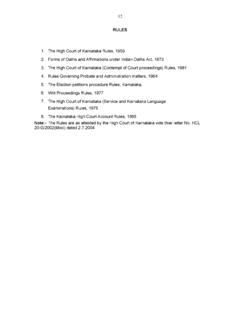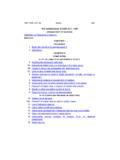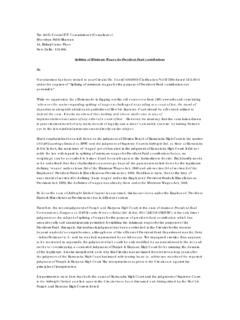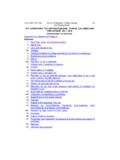Transcription of CONSTITUTIONAL COURT OF SOUTH AFRICA [2011] ZACC 26 ...
1 CONSTITUTIONAL COURT OF SOUTH AFRICA Case CCT 95/10 [2011] ZACC 26 In the matter between: ALEXANDER GERHARD FALK First Applicant FALK REAL ESTATE SA (PTY) LTD Second Applicant and NATIONAL DIRECTOR OF PUBLIC PROSECUTIONS Respondent Heard on : 8 March 2011 Decided on : 16 August 2011 JUDGMENT VAN DER WESTHUIZEN J: Introduction [1] Combating crime poses a huge challenge to SOUTH AFRICA and the rest of the world. The globalised nature of organised crime adds to the difficulty. Legislation aimed at the prevention of organised crime and at the recovery of assets relating to criminal activities VAN DER WESTHUIZEN J 2 exists in several International co-operation is essential for the effective implementation of the legislation.
2 [2] This case is about the interpretation of and relationship between two SOUTH African statutes that deal with restraint orders in criminal matters. The one, the Prevention of Organised Crime Act2 (POCA), provides for the issue of restraint orders by SOUTH African courts regarding the property of persons against whom criminal proceedings are pending or about to be instituted. The other, the International Co-operation in Criminal Matters Act3 (ICCMA), provides for the enforcement in SOUTH AFRICA of restraint orders that have been issued in the course of criminal proceedings in foreign states.
3 [3] This is an application for leave to appeal against a judgment of the Supreme COURT of The Supreme COURT of Appeal dismissed with costs an appeal against a judgment of the Western Cape high COURT , Cape Town ( high COURT ).5 1 See for example: the Proceeds of Serious Crime Act 19 of 1990 in Botswana; the Prevention of Organised Crimes Act 5 of 2010 in Kenya; the Prevention of Organised Crime Act 29 of 2004 in Namibia; the Serious Offences (Confiscation of Proceeds) Act 8 of 2001 in Swaziland; the Proceeds of Crime Act 25 of 1991 in Tanzania; section 981(a)(1)(C) of 18 USC 1996 (as amended by the Civil Asset Forfeiture Reform Act of 2000) in the United States; the Proceeds of Crime Act 2002 in the United Kingdom.
4 Section of the Criminal Code RSC 1985 c C-46 in Canada; the Proceeds of Crime Act 85 of 2002 in Australia; the Criminal Proceeds (Recovery) Act 8 of 2009 in New Zealand; the Karnataka Control of Organised Crime Act 1 of 2000 in the Karnataka State of India; and the Maharashtra Control of Organised Crime Act 30 of 1999 in the Maharashtra State of India. 2 121 of 1998. 3 75 of 1996. 4 Falk and Another v National Director of Public Prosecutions, Supreme COURT of Appeal, Case No 689/09, 23 September 2010, as yet unreported (SCA judgment). 5 Falk and Another v National Director of Public Prosecutions, Western Cape high COURT , Cape Town, Case No 8420/03, 10 July 2009, unreported ( high COURT judgment).
5 VAN DER WESTHUIZEN J 3 [4] The applicants are Mr Alexander Gerhard Falk a German businessman and Falk Real Estate SA (Pty) Ltd (FRSA), a SOUTH African company in which he is the sole shareholder. The respondent is the National Director of Public Prosecutions (NDPP). [5] A restraint order granted in the course of criminal proceedings against Mr Falk by a COURT in Hamburg, Germany, was registered in SOUTH AFRICA by the Registrar of the high COURT (Registrar). The high COURT subsequently issued an order interdicting the applicants from dealing with assets in SOUTH AFRICA . The applicants have unsuccessfully attempted to set aside the registration of the German order and the subsequent interdictory [6] The core issues to be addressed are (a) whether the registration of the foreign restraint order should be set aside; and (b) whether the interdictory order should be rescinded.
6 [7] These issues raise questions about which of the two statutes ICCMA or POCA is applicable to the registration and to the interdictory order and whether the requirements in the relevant statute for setting aside the registration and the interdictory order have been met. Some preliminary questions also require attention, namely whether a 6 A more detailed factual and litigation background is provided below at [21] [39]. VAN DER WESTHUIZEN J 4 CONSTITUTIONAL matter is raised, whether leave to appeal should be granted and whether new evidence should be admitted.
7 [8] With these questions in mind, an overview of the CONSTITUTIONAL and statutory framework, an account of the factual and litigation background and a summary of the parties submissions in this COURT are provided. These show how the approach to the issues raised has evolved since the beginning of the litigation. Thereafter an analysis and conclusions follow. CONSTITUTIONAL and statutory framework [9] The determination of this case relies on the interpretation of several provisions of two complex statutes against the background of the Constitution. Thus it is convenient first to set out the applicable CONSTITUTIONAL and statutory framework.
8 [10] In SOUTH AFRICA , POCA is the statutory instrument that addresses organised crime. Its preamble specifies its objectives, namely to combat the rapid growth of organised crime, money laundering and criminal gang activities and to ensure that no person should benefit from the fruits of unlawful activities . [11] POCA sets forth a scheme for confiscation orders in Chapter 5. This Chapter provides for the restraint of the benefits derived from crime where criminal proceedings are pending or about to be instituted. It also provides for confiscation after a conviction VAN DER WESTHUIZEN J 5 has occurred.
9 A confiscation order under Chapter 5 is a civil judgment for the payment of an amount of money based on the value of the benefit that the defendant derived from the crime. [12] Part 3 of Chapter 5 of POCA deals with restraint orders. According to section 26(1) a restraint order is an order prohibiting any person, subject to such conditions and exceptions as may be specified in the order, from dealing in any manner with any property to which the order relates. Under section 26(1) the NDPP may apply ex parte to a high COURT for such an order. Section 26(2) stipulates the kind of property in respect of which a restraint order may be Section 25 outlines when a restraint order may be 7 Section 26(1) and (2) provides: (1) The National Director may by way of an ex parte application apply to a competent high COURT for an order prohibiting any person, subject to such conditions and exceptions as may be specified in the order, from dealing in any manner with any property to which the order relates.
10 (2) A restraint order may be made (a) in respect of such realisable property as may be specified in the restraint order and which is held by the person against whom the restraint order is being made; (b) in respect of all realisable property held by such person, whether it is specified in the restraint order or not; (c) in respect of all property which, if it is transferred to such person after the making of the restraint order, would be realisable property. 8 Section 25 provides: (1) A high COURT may exercise the powers conferred on it by section 26(1) (a) when (i) a prosecution for an offence has been instituted against the defendant concerned; (ii) either a confiscation order has been made against that defendant or it appears to the COURT that there are reasonable grounds for believing that a confiscation order may be made against that defendant.
















